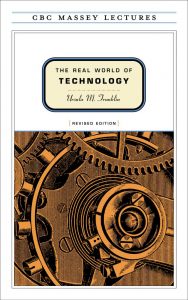 Ursula Franklin, in The Real World of Technology wrote:
Ursula Franklin, in The Real World of Technology wrote:
Technology is not the sum of the artifacts, of the wheels and gears, of the rails and electronic transmitters. Technology is a system. It entails far more than its individual material components. Technology involves organization, procedures, symbols, new words, equations, and, most of all, a mindset.
Being a mindset, technology then is an ideology.
In her expanded book – which were a series of lectures – Franklin examines the impact of technology upon our lives and addresses the extraordinary changes since The Real World of Technology was first published. She added four new chapters and discusses “the dilution of privacy and intellectual property rights, the impact of the current technology on government and governance, the shift from consumer capitalism to investment capitalism, and the influence of the Internet upon the craft of writing.”
She writes on the political and ethical aspects of technology:
“Whenever somebody talks to you about benefits or costs of particular development don’t ask whatbenefits, ask whose benefits, whose costs. To come back to the discourse that we have to have with each other: on the basis of these discussions we could make up a checklist … let’s make a civic list. When one looks at projects that are under discussion … one can ask:
- Whether it promotes justice.
- Whether it restores reciprocity.
- Whether it confers divisible or individible benefits.
- Whether it favors people over machines.
- Whether the strategy of implementation maximizes gain or minimizes disaster.
- Whether conservation is favored over waste.
- Whether the irreversible stands back because the reversible is favored.”